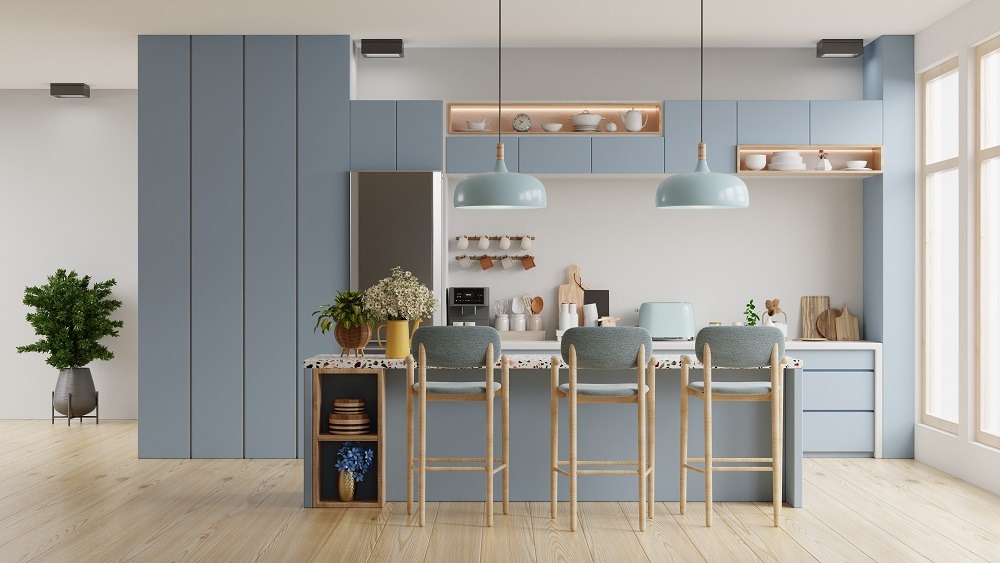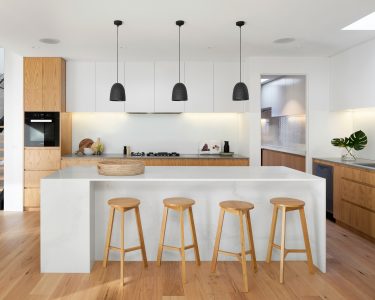Hiring a kitchen remodeling contractor can make or break your kitchen renovation. If they understand your vision, timeline, and budget can transform your kitchen into a stylish and functional space.
But not all contractors are the same, which is why you need to ask the right questions. Asking questions helps you clarify expectations, uncover red flags, and make confident decisions.
It’s about more than just getting the lowest price. It’s about understanding how a contractor works, communicates, and handles challenges.
These conversations help you gauge the contractor’s process, values, and capabilities. When you get these answers upfront, you avoid confusion and stay confident throughout the remodeling process.
Why Should You Interview a Kitchen Remodeling Contractor First?
Interviewing a kitchen remodeling contractor tells you about their experience, communication skills, and project planning process. It ensures you’re hiring someone who understands your vision, budget, and timeline. A thorough conversation upfront can prevent miscommunication and unexpected issues during construction.
A kitchen remodel impacts your daily life, disrupts your routine, and involves significant financial investment. Interviewing contractors allows you to compare quotes, timelines, and design sensibilities.
It also gives you a preview of their professionalism and responsiveness. Those qualities are just as important as skill.
Miscommunication often arises when assumptions go unspoken. By asking detailed questions, you clarify what’s included in the estimate, how changes will be handled, and who your point of contact will be.
This makes surprise costs, scheduling delays, or disagreements less likely once construction begins. Early conversations can also uncover potential mismatches in design preferences or working styles.
What Experience Do You Have With Kitchen Renovations Like Mine?
Kitchen remodeling is never one-size-fits-all. Whether you’re planning an open-concept layout, a traditional galley-style kitchen, or a modern upgrade with custom features, it’s important that your contractor has handled similar projects before.
Ask for a portfolio of their previous work. Look for similarities in scope, size, and style. Ask if they’ve completed kitchen remodels in your town. Local experience is helpful for navigating permit processes and understanding local codes.
When a contractor has worked on projects like yours, they’re more likely to expect challenges specific to your layout, materials, or design goals. They’ll know how to work within similar space constraints, recommend proven solutions, and avoid mistakes they’ve already learned from on past jobs.
This kind of experience helps streamline the process, reduce costly missteps, and improve the outcome of your remodel.
Pay extra close attention to:
- Photos of completed kitchens with similar features
- Examples of problem-solving or design innovation
- References from local homeowners
Are You Licensed and Insured in New Jersey?
Yes, your contractor should be fully licensed and insured in New Jersey. This protects you from liability, ensures compliance with building codes, and reflects a commitment to professional standards.
Don’t take risks with unlicensed or uninsured contractors. Ask for their license number and verify it with the state. Confirm that they carry liability insurance and workers’ compensation. This protects both your property and the people working on it.
Hiring someone without proper licensing may seem less expensive upfront, but it can lead to major problems later. Unlicensed contractors often skip permits, cut corners, and may not follow state building codes. They could leave you with unsafe or substandard work.
If they cause property damage or someone is injured on the job, you could be held financially responsible. You also have fewer legal options if the contractor abandons the project or fails to meet the terms of your agreement.
Verifying licensing and insurance isn’t just a formality. It’s a huge step in protecting your investment.
You may also want to ask whether they’re familiar with specific town regulations or HOA requirements.
How Do You Handle Project Planning and Communication?
Clear communication during kitchen remodeling is essential. Your contractor should provide detailed timelines, choose a project manager, and offer regular updates. Open communication helps homeowners stay informed from concept to completion.
Kitchen remodels are complex. Delays can happen, material choices can change, and issues can arise behind walls or under floors. A contractor who communicates well is more likely to keep your project, and stress levels, where they should be.
Strong planning and communication are what tie every phase of the remodel together. From demolition and plumbing rough-ins to final fixture installations, each step depends on proper coordination.
When the contractor outlines a clear schedule and keeps you updated on progress and potential issues, you can make informed decisions quickly. It also reduces the risk of misunderstandings around costs, scope changes, and deadlines.
Without reliable communication, even small setbacks can spiral into bigger delays.
Ask:
- Will I have a single point of contact?
- How often will I receive updates?
- Do you use project management tools or weekly meetings?
Can You Help With Kitchen Design and Layout?
Great kitchen remodeling contractors do more than install cabinets. They understand how to optimize space, light, and flow. Whether you want an island with seating, custom pantry storage, or energy-efficient appliances, your contractor should help translate your ideas into a smart layout.
Experienced contractors can take your inspiration and turn it into functional, buildable plans. They know how to balance your preferences with practicality and code requirements, all while improving the kitchen’s traffic flow and usability.
For example, they might suggest repositioning appliances, widening walkways, or incorporating hidden storage solutions.
A good contractor will also help you identify which design elements offer the most long-term value, and which features may push you beyond your budget.
Ask if they collaborate with designers or offer in-house design services. Clarify whether they follow principles like the “kitchen triangle” (sink, stove, fridge) for efficient movement and use.
Helpful follow-ups:
- Do you provide 3D renderings or mockups?
- Can I choose my own materials?
- Will you help with fixture and finish selection?
What Materials and Brands Do You Work With?
The quality of your kitchen depends on the materials used. A knowledgeable contractor should explain your options for cabinetry, countertops, flooring, and more.
Contractors with experience using a wide range of materials and brands can help you make smarter decisions. They understand which countertop surfaces hold up best under daily use, which cabinets offer better longevity, and which flooring options are practical for high-traffic kitchens.
They can also steer you away from flashy trends that don’t perform well over time or need costly maintenance.
Ask your contractor about:
- Countertops – Do they install granite, quartz, or butcher block? Which are most durable?
- Cabinetry – Do they offer stock, semi-custom, or fully custom cabinets?
- Appliances – Can they install energy-efficient models from trusted brands?
- Lighting – Are they familiar with layered lighting (task, ambient, accent)?
- Flooring and backsplash – Do they provide guidance on coordinating finishes?
Understanding your choices early helps prevent budget overruns and miscommunication down the line.
What Is the Timeline for Completion?
Most kitchen remodels take several weeks, depending on complexity. Your contractor should outline a realistic timeline with start and end dates, potential delays, and how they manage them. Timelines should include demo, installation, and final walkthrough.
In general, a standard kitchen remodel in New Jersey takes 4 to 8 weeks. More complex projects with structural work or major design changes may take longer. Always ask how delays (like permit approval or supply chain issues) are handled.
Here’s what a general kitchen remodel usually looks like time-wise:
General Step-by-Step Kitchen Remodeling Timeline
- Initial Planning and Design (1–2 weeks) Finalizing layout, materials, appliances, and design plans. This phase may include design consultations, measuring, and 3D renderings.
- Permits and Ordering Materials (1–3 weeks) The contractor applies for permits and orders custom cabinetry, appliances, and other long-lead items. Waiting times can vary based on product availability.
- Demolition (2–5 days) Existing cabinetry, appliances, flooring, and walls (if necessary) are removed. Dust control and debris removal should be part of the contractor’s plan.
- Rough-In Work (1 week) Plumbing, electrical, and HVAC systems are updated or relocated based on the new layout. Inspections may be required before moving forward.
- Flooring Installation (2–4 days) Flooring is installed once the subfloor is prepped and dry. Timing depends on the material. Tile and hardwood may take longer due to drying or sealing.
- Cabinetry Installation (3–5 days) Base and wall cabinets are installed according to the new layout. This step must be precise, as everything else (like countertops) depends on it.
- Countertop Template and Installation (1–2 weeks) After cabinets are in, the contractor templates the countertops. Fabrication and installation follow, with timeframes depending on the material.
- Backsplash, Lighting, and Finish Electrical (3–5 days) Lighting fixtures, backsplash tiles, and outlets/switches are installed. Final plumbing connections for the sink, dishwasher, and faucet are completed.
- Final Touches and Walkthrough (2–3 days) Hardware is installed, paint touch-ups are completed, and a final walkthrough is conducted to ensure everything meets your expectations.
What’s Included in the Contract and Estimate?
Your kitchen remodeling contract should detail materials, labor, permits, payment schedule, and a dispute resolution clause. The estimate should break down costs for each phase and item.
Before you sign anything, ask for a written, itemized quote. It should clearly outline labor costs, material costs by category (tile, cabinets, fixtures, etc.), timeline for payments, and warranties and cleanup procedures.
Getting everything in writing protects both you and the contractor. A detailed contract helps avoid misunderstandings and holds each party accountable. It also provides legal recourse if something goes wrong.
It also prevents “scope creep,” where the project expands without clear cost approvals. If there’s ever a disagreement, written documentation serves as a reliable reference.
Verbal agreements are easily forgotten or misinterpreted, especially during a fast-moving renovation. The more specific your contract and estimate, the smoother your project will run from start to finish.
Compare many estimates to identify large discrepancies, which could be a red flag.
How Do You Handle Permits and Inspections?
In New Jersey, kitchen remodels often need permits for plumbing, electrical, or structural changes. A good contractor handles this on your behalf and schedules required inspections to ensure compliance.
Working without the proper permits may seem like a shortcut, but it can lead to serious consequences. If your renovation isn’t inspected and approved by the local building department, you could face fines, forced demolition of unapproved work, or costly corrections down the line.
Unpermitted work may also create problems during a future home sale. Buyers and lenders often need verification that renovations were properly permitted and inspected.
Permits also help ensure safety. Electrical and plumbing systems that are not inspected could pose fire hazards, water damage risks, or violate local codes. A reputable contractor will know which parts of your kitchen remodel need permits and secure them before work begins.
Follow up with:
- Have you pulled permits in this town before?
- How long does permitting usually take here?
- Will I be required to do anything for approval?
Kitchen Remodeling Contractor FAQs
How do I find a reliable kitchen remodeling contractor?
Look for licensed, insured contractors with strong local references, transparent contracts, and a history of successful kitchen remodels.
What should I include in a kitchen remodeling budget?
Include materials, labor, design services, permits, temporary accommodations, and a contingency fund for unexpected costs.
How long does it take to remodel a kitchen in NJ?
Most projects take 4–8 weeks depending on complexity, materials, and permit approval.
What Should You Do Before Hiring a Kitchen Remodeling Contractor?
Before hiring any kitchen remodeling contractor, prepare a list of questions like those above. Interview many professionals, compare estimates, and don’t be afraid to ask for references. The best contractors will welcome your questions and offer clear, thoughtful answers.
If you’re remodeling a kitchen choose a contractor familiar with your area and committed to communication. Every successful kitchen remodel is built on the relationship between homeowner and contractor. So, ask the right questions, and get the kitchen you deserve.





